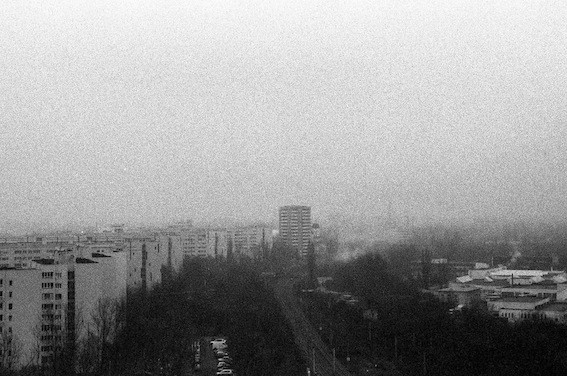Bucharest Biennale 6
23 May - 24 Jul 2014
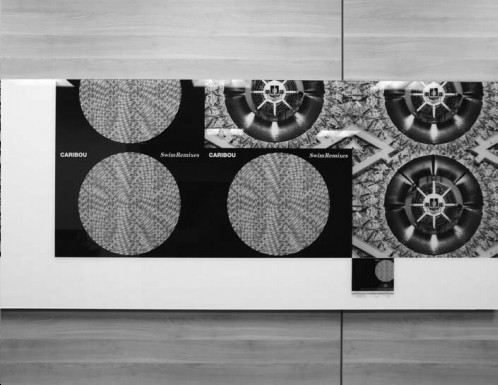
Adrian Dan
untitled.reactor as JPEG image
dimensions: 11811x 5906, color space: RGB and c-print, diasec, 2012.
Courtesy of the artist and Bucharest Biennale.
untitled.reactor as JPEG image
dimensions: 11811x 5906, color space: RGB and c-print, diasec, 2012.
Courtesy of the artist and Bucharest Biennale.
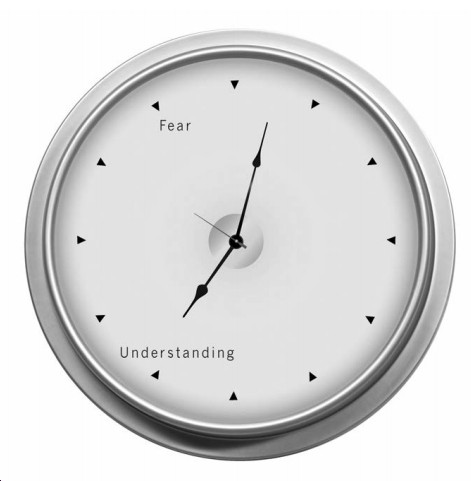
Raqs Media Collective
Meanwhile/Elsewhere (Fear and Understanding)
vinyl, 1.3 sqm., 2014.
Courtesy of the artist and Bucharest Biennale.
Meanwhile/Elsewhere (Fear and Understanding)
vinyl, 1.3 sqm., 2014.
Courtesy of the artist and Bucharest Biennale.
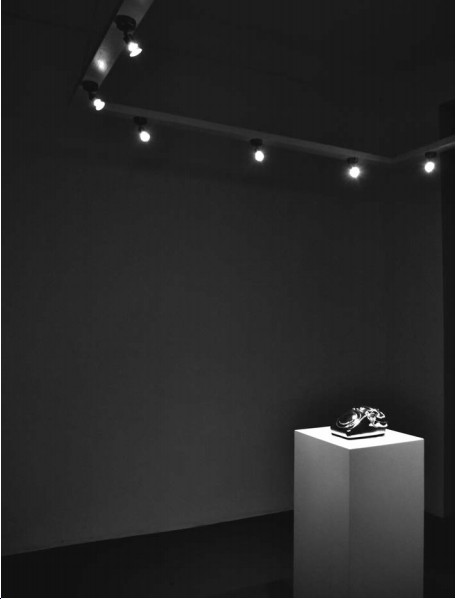
Filip Gilissen
Knowing Me Knowing You
2012, intervention, private phone number of Răzvan Ion consisting of 10 golden flickering digits hanging from
a 3 x 4,5 meter steel frame and placed outside at the Bucharest Biennale main venue, synthetic golden
phone on pedestal displayed in the darkened gallery space with spotlights.
Special edition for Bucharest Biennale 6. Courtesy of the artist and Bucharest Biennale.
Knowing Me Knowing You
2012, intervention, private phone number of Răzvan Ion consisting of 10 golden flickering digits hanging from
a 3 x 4,5 meter steel frame and placed outside at the Bucharest Biennale main venue, synthetic golden
phone on pedestal displayed in the darkened gallery space with spotlights.
Special edition for Bucharest Biennale 6. Courtesy of the artist and Bucharest Biennale.
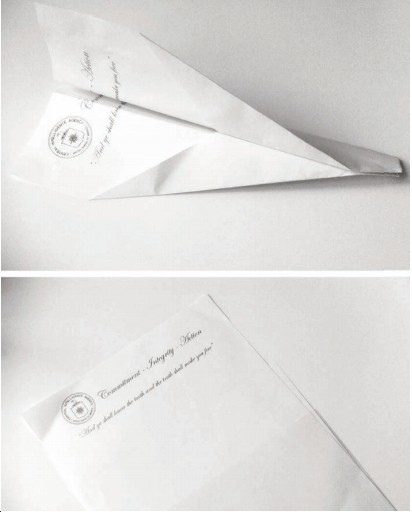
Alejandro Vidal
Any idea that can be defended is presumed guilty
installation, paper plane folded with CIA original letter office paper, desk, dimensions variable, 2011.
Courtesy of the artist and Bucharest Biennale.
Any idea that can be defended is presumed guilty
installation, paper plane folded with CIA original letter office paper, desk, dimensions variable, 2011.
Courtesy of the artist and Bucharest Biennale.
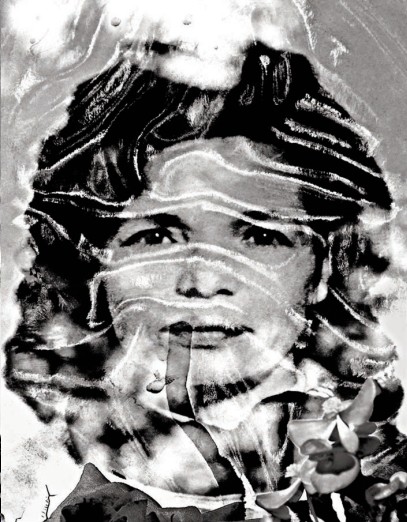
Jan Kaila
Second Death
installation, two video projections with sound in different venues, dimensions variable, 2007.
Courtesy of the artist and Bucharest Biennale
Second Death
installation, two video projections with sound in different venues, dimensions variable, 2007.
Courtesy of the artist and Bucharest Biennale
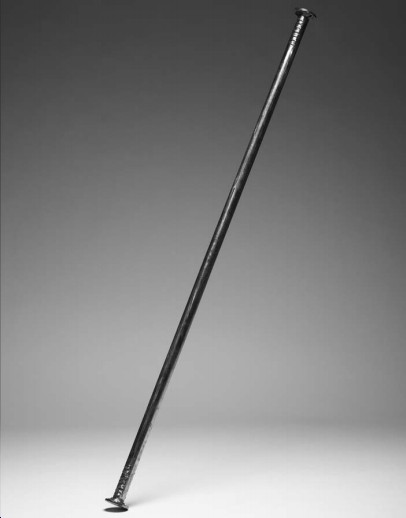
Zoltán Béla
Nonfunctional Object
painted nail with two heads
150 cm, 2004.
Courtesy of the artist, Anca Poterașu Gallery and Bucharest Biennale.
The work is part of Jean Philippe Guibert-Lassagne collection.
Nonfunctional Object
painted nail with two heads
150 cm, 2004.
Courtesy of the artist, Anca Poterașu Gallery and Bucharest Biennale.
The work is part of Jean Philippe Guibert-Lassagne collection.
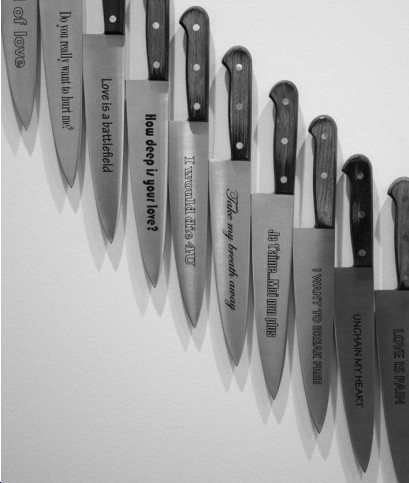
Carlos Aires
How deep is your love,
stainless steel knifes engraved with titles of love songs, dimensions variable, 2011.
Courtesy of the artist and Bucharest Biennale
How deep is your love,
stainless steel knifes engraved with titles of love songs, dimensions variable, 2011.
Courtesy of the artist and Bucharest Biennale
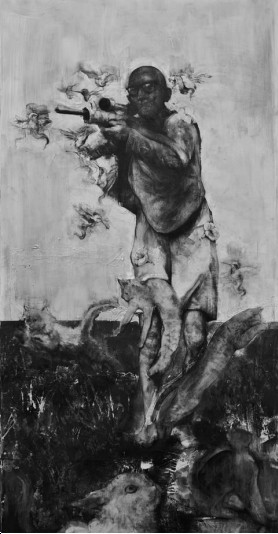
Dan Beudean
The Hunter
mixed media on canvas, 165 x 80 cm, 2013.
Courtesy of the artist and Bucharest Biennale.
The Hunter
mixed media on canvas, 165 x 80 cm, 2013.
Courtesy of the artist and Bucharest Biennale.
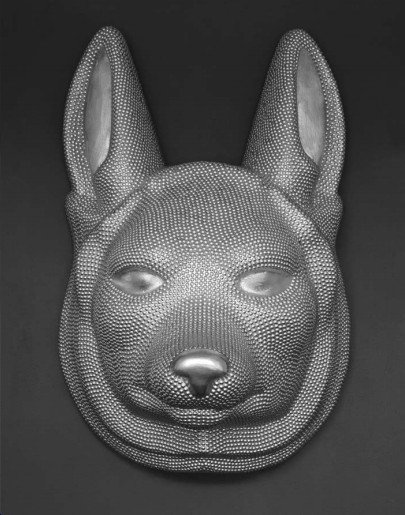
Arantxa Etcheverria
The Wolf
installation, polyurethane, metal pins, acrylic spray, 120 x 90 x 75 cm, 2009.
Courtesy of the artist and Bucharest Biennale.
The Wolf
installation, polyurethane, metal pins, acrylic spray, 120 x 90 x 75 cm, 2009.
Courtesy of the artist and Bucharest Biennale.
BUCHAREST BIENNALE 6
23 May - 24 July 2014
Apprehension. Understanding Through Fear of Understanding
As soon as we are born, fear becomes an essential part of our lives. A mild persecution complex develops. Fear is induced through certain events, by the people around us, through their actions and knowledge, be it warranted or not, conscious or unconscious.
Freud explained in Civilization and Its Discontents that we have an unconscious need for punishment, which is an `instinctual manifestation on the part of the ego, which has become masochistic under the influence of the sadistic super-ego’. Before we try to defeat any external oppressive power, we must examine ourselves. The inherent need for punishment, the thought that we deserve what we get, has to be considered. Freud goes on to say that this inherent need for punishment `is a portion, that is to say, of the instinct toward internal destruction present in the [unconscious] ego, employed for forming an erotic attachment to the super-ego’. We create pleasure out of received aggression to deal with the cruel super-ego. The super-ego’s self-aggression stems from our incapacity, as infants, to fully externalize our biological aggression, so parts of this aggression turn into self-aggression. So, it seems, for us to be able to abolish any form of punitive power, first we must, in some measure, destroy ourselves or come to terms with the masochistic and sadistic parts of our psyche. This is no simple task. It is easier to accept and submit to certain constructs than to abolish them. Getting to a state of being able to raise the questions which generate progress is an extensive endeavor, but interrogation is the most powerful and effective tool any- one has ever had at their disposal to evolve.
Excerpt from the curatorial text of Bucharest Biennale 6 by Gergő Horváth.
Participants:
Carlos Aires (ES)
Matei Arnăutu (RO)
Dan Beudean (RO)
Adrian Dan (RO)
Dromedar (NO)
Arantxa Etcheverria (FR/RO)
Filip Gilissen (BE)
Bjørn Erik Haugen (NO)
Jan Kaila (FI)
Cezar Lăzărescu & 1+1 (RO)
Raqs Media Collective (IN)
Marilena Preda-Sânc (RO)
Gabriel Stoian (RO)
Stephanie Syjuco (USA/PH)
János Sugár (HU)
Alejandro Vidal (ES)
Erwin Wurm (A)
Mihai Zgondoiu (RO)
Zoltán Béla (RO)
Curator: Gergő Horváth
23 May - 24 July 2014
Apprehension. Understanding Through Fear of Understanding
As soon as we are born, fear becomes an essential part of our lives. A mild persecution complex develops. Fear is induced through certain events, by the people around us, through their actions and knowledge, be it warranted or not, conscious or unconscious.
Freud explained in Civilization and Its Discontents that we have an unconscious need for punishment, which is an `instinctual manifestation on the part of the ego, which has become masochistic under the influence of the sadistic super-ego’. Before we try to defeat any external oppressive power, we must examine ourselves. The inherent need for punishment, the thought that we deserve what we get, has to be considered. Freud goes on to say that this inherent need for punishment `is a portion, that is to say, of the instinct toward internal destruction present in the [unconscious] ego, employed for forming an erotic attachment to the super-ego’. We create pleasure out of received aggression to deal with the cruel super-ego. The super-ego’s self-aggression stems from our incapacity, as infants, to fully externalize our biological aggression, so parts of this aggression turn into self-aggression. So, it seems, for us to be able to abolish any form of punitive power, first we must, in some measure, destroy ourselves or come to terms with the masochistic and sadistic parts of our psyche. This is no simple task. It is easier to accept and submit to certain constructs than to abolish them. Getting to a state of being able to raise the questions which generate progress is an extensive endeavor, but interrogation is the most powerful and effective tool any- one has ever had at their disposal to evolve.
Excerpt from the curatorial text of Bucharest Biennale 6 by Gergő Horváth.
Participants:
Carlos Aires (ES)
Matei Arnăutu (RO)
Dan Beudean (RO)
Adrian Dan (RO)
Dromedar (NO)
Arantxa Etcheverria (FR/RO)
Filip Gilissen (BE)
Bjørn Erik Haugen (NO)
Jan Kaila (FI)
Cezar Lăzărescu & 1+1 (RO)
Raqs Media Collective (IN)
Marilena Preda-Sânc (RO)
Gabriel Stoian (RO)
Stephanie Syjuco (USA/PH)
János Sugár (HU)
Alejandro Vidal (ES)
Erwin Wurm (A)
Mihai Zgondoiu (RO)
Zoltán Béla (RO)
Curator: Gergő Horváth

